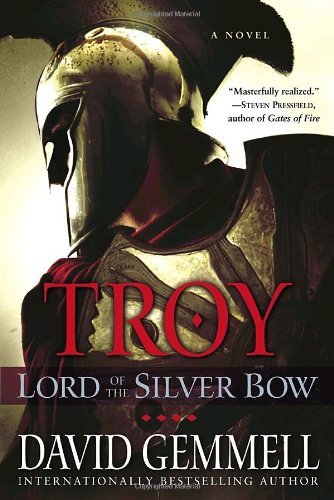
![]() Lord of the Silver Bow by David Gemmell
Lord of the Silver Bow by David Gemmell
I tried reading David Gemmell‘s Lord of the Silver Bow about 9 months before I actually read it. It was heavy, plodding, and confusing. I was looking for a fun story full of action and adventure, and I love history… but, alas, I stopped reading after about 50 pages, and kind of figured that I was simply beyond the age when testosterone-fueled adventures could carry a story. I gave it a second shot, and it turns out, I was wrong. This first in Gemmell’s trilogy that retells the story of the Trojan War is enjoyable, fun, and surprisingly deep.
Gemmell’s language and themes are audacious and often mythic. The story and themes are soaked in an age of heroism when Gods were considered real, and honor and courage were as coveted as bronze. The dialogue drives big and bold themes, addressed by bigger and bolder men (mostly), and acted upon in the most courageous (and sometimes cowardly) ways. This isn’t a fantasy novel. This is historical fiction… taking nuggets from the well-trodden story of Troy, and molding them into a new shining historical epic.
No force under the stars is more powerful than hatred.
War’s a’ brewin’ on the wine-dark sea, and Aeneas, known by his nickname Helikaon, isn’t helping the situation through his enflamed vendetta against the Mykene general Kolanos. Aeneas is at the center of Lord of the Silver Bow, and he has anger issues. He would go on, as legend would tell, to establish one the greatest of ancient empires: Rome. He’s one of the most respected men across the Aegaen despite the fact that he’s beloved in the East and hated in the West.
Battlefield philosophy rings loudly throughout the book. Helikaon states,
A great man once told me there can be no courage without fear. He was right. Remember that when your belly trembles and your legs grow weak.
And later, Odysseus says,
A man who rushes into battle fearlessly is not a hero. He is merely a strong man with a big sword. An act of courage requires the overcoming of fear.
One of the most predominant and heavy themes is the consideration of what makes a person good or bad… moral or evil. Not unlike the gods of Greek mythology, the characters in Lord of the Silver Bow all have aspects of weakness. While the deeds and emotions are enormous, very few characters are pure evil or purely heroic. Their decisions and actions are just ‘right’ enough, or just ‘wrong’ enough to balance the scales towards one end or the other. An Egyptian joins Helikaon’s crew and brings his own brand of philosophical views into the equation and he embraces the inherent contradiction of the human state of being. He states that good and evil are in everyone and at constant war.
All of us are capable of great compassion and love or hatred and horror. Sadly, we can take joy from both.
In another theme, Gemmell’s characters explore loss and the context of what it means, and its lasting impact. The emotions felt by the characters are deep and acute. And in the context of this story, with all of its mythological proportions, the sometimes melodramatic emotions fit. Who wouldn’t feel the internal slice of a lost love; or the death of someone close? The pain doesn’t slip away quickly or easily.
Lord of the Silver Bow is a terrific book. Your expectations must revolve around the fact that this is a fictional retelling of the enormous, and enormously dramatic, historical-fantasy of The Illiad. In that context, the book hits on almost all cylinders.
Gemmell’s TROY trilogy continues with book two, Shield of Thunder.






Sounds like an interesting departure.